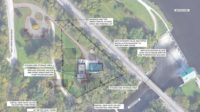A subcontractor’s employee on an eastern New Orleans pump station project died April 12 from crushing wounds sustained in an accident.
William Morgan, 32, of Abita Springs, La. died from injuries including a crushed chest. He was working on a U.S. Army Corps of Engineers project in eastern New Orleans.
Morgan was an employee of Great Southern Dredging, Inc., Mandeville, La. a sub-contractor to a joint venture of Archer Western, Atlanta, Ga. and Alberici, St. Louis, Mo., which holds a $300 million contract with the U.S. Army Corps of Engineers.
The work includes widening and elevating five miles of earthen levees, constructing several sections of concrete, T-shaped floodwalls and enhancing two pump stations as part of the Corps’ $14.6 billion program in New Orleans to improve perimeter flood protections. Contractors are racing to meet a June 1 deadline on system projects.
The accident occurred at what is called CTU-6 Pump Station in eastern New Orleans, a U.S. Fish and Wildlife pump station that supports the Bayou Sauvage National Wildlife Refuge, says Nancy Allen, public affairs officer for the Corps Hurricane Protection Office.
The joint venture contractor is replacing a platform-mounted 36-inch pump and associated piping on both sides of the newly-raised levee. CTU-6 is located approximately 4 miles east of the Lake Borgne Inner Harbor Navigation Canal Storm Surge Barrier, about mid-way between the Gulf Intracoastal Waterway and the CSX Railroad Crossing.
All that is publicly known is that Morgan and a crew were working on a pump.
“The job site was immediately shut down following the accident and work has not yet resumed at CTU-6 Pump Station,” Allen says. “A Board of Investigation has been convened.”
A spokesperson at Great Southern Dredging indicated the company has no comment, other than that the accident is “under investigation by the USACE.”
Prior to this accident, the Corps’ Hurricane Protection Office reported that contractors worked 2.3 million man-hours with a .09 incident rate for fiscal year 2011, and 2.6 million man-hours with a frequency rate of .30 for fiscal year 2010.


Post a comment to this article
Report Abusive Comment